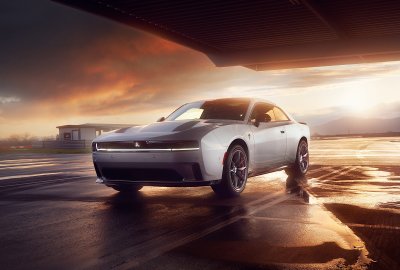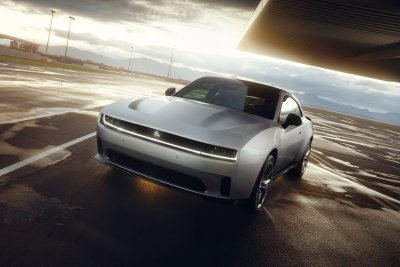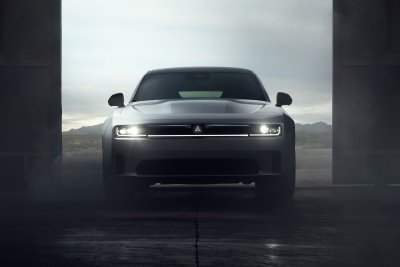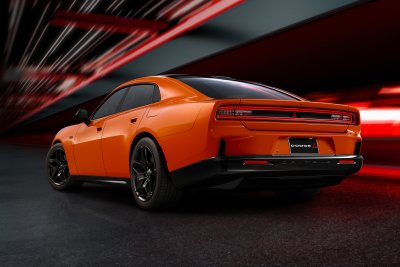Dodge is committed to building muscle cars. Whether they're electric or gasoline-powered, it makes no difference to the company. They said as much 18 months ago when the two-door electric Charger Daytona premiered. That concept is now reality.
However, the Charger lineup isn't kicking gasoline cold turkey. The company's new twin-turbocharged six-cylinder Hurricane gasoline engine, already installed in Jeep and Ram products, will also find a home in the lineup. Those models won't wear the Daytona badge, instead simply being called Chargers.
Chargers and the Charger Daytona will be offered in two- and four-door variants. The two-door Dodge Charger Daytona will go on sale later this year. Production of all-electric four-door models and gas-powered Chargers will begin in the first quarter of 2025, at the company's Windsor (Ontario) Assembly Plant.
"Ten or twelve years ago, we started distilling the brand down to be this performance based American Muscle brand—and being very true to that ethos and making sure that we're delivering exactly what those customers want. Forget about everything else," Tim Kuniskis, Dodge CEO, said at the unveiling of the 2024 and 2025 model year vehicles.



"Millions of horsepower later, everybody understands the brand. But while we were doing that, we knew the storm was ahead of us. We knew the regulations were tightening in around us."
"We're in the midst of seeing a total transformation of Dodge's perhaps most iconic nameplate," Robby DeGraff, Manager of Product and Consumer Insights at AutoPacific told Newsweek. "The next Charger takes quite the different path than its predecessor (and the Challenger sibling). Gone are the V8s and rear wheel drive footprint to make way for performance-focused electrification. I think Dodge is making the right move by not exclusively selling the Charger as an EV."
While sales of battery-electric vehicles in the U.S. have slowed this year, they are still trending upwards with Americans warming to new electrified powertrain options.
"We have to remember that not everybody is ready, able to, or wants to fully commit to an EV. By still offering the Charger with the "Hurricane" turbo six-cylinder, consumers still have the choice in their desired propulsion and that approach ensures sales because chances are, far more ICE Chargers are going to be sold and wanted than EVs at this point," DeGraff said.
"When we surveyed future Dodge brand considerers, only about 15 percent plan to buy an EV whereas 53 percent intend to buy another gas vehicle. Same for the sedan, I'm glad that'll be offered again too, and the fact it has a proper lift back boosts practicality tremendously."


The Dodge Charger Daytona R/T and Dodge Charger Daytona Scat Pack will arrive first. The newly styled front end of the Charger features a dipping front end for aerodynamic purposes, recalling the '60s and '70s NASCAR winner, earning the car the Daytona moniker.
The 2024 Dodge Charger Daytona Scat Pack will deliver 670 horsepower (hp) and reach 60 mph in 3.3 seconds. The Charger Daytona R/T delivers 496 hp. Both use a 100.5-kilowatt-hour battery and two motors for all-wheel drive.
However, Dodge being a muscle car company, all versions will be able to send power to the rear wheels only, some with Drift and Donut drive modes in addition the usual Normal, Sport, Track and Custom. Each of those modes get their own "exhaust" noise, the company said.
The Charger Daytona R/T will have an all-electric range of 317 miles while the more powerful Scat Pack is preliminarily rated at 260 miles. Both have 400-volt architecture (the future Charger Daytona Banshee will have an 800-volt system) and both have a peak charge rate on a 350-kilowatt charger of 183 kilowatts.
Dodge says on a DC fast charger both vehicles can refill from 5 to 80 percent in 32.5 minutes. On a home Level 2 charger it takes about 6.5 hours.


The new gasoline-powered Dodge Charger, also coming in all-wheel drive with a rear-drive mode, offers up a 550-horsepower version of the company's Hurricane engine with a fresh name. The company is calling it the SixPack High Output engine. The base Dodge Charger will get the same engine, tuned differently, and labeled as the Standard Output SixPack, with 420 hp.
All new Chargers will have a hatchback that looks like a trunk, offering 38.5 cubic feet of cargo space. That's more than double the previous model.
Dodge says it used the 1968 Dodge Charger for inspiration with textures and horizontal lines in the car's cabin. Vintage meets modern as the car comes standard with a 10.25-inch or available 16-inch digital instrument cluster, along with a standard 12.3-inch center display.
Ambient lighting in an available 64 colors extends around the front seats. A flat top/bottom steering wheel features paddles for different levels of regenerative braking on Charger Dayton models while a pistol-grip shifter selects gears. On the gasoline-powered Chargers, those paddles will be for shifting gears.
Wireless Apple CarPlay and Android Auto are standard, as is Alexa voice assistant technology. A digital key function allows owners to use their smartphones to unlock and start the vehicles.
Cloth and vinyl seats are standard. Black and red Nappa leather seats are optional. A new high-backed fixed headrest seat is also available with the Plus Package, Track Package and Carbon and Suede Package.
The 2024 Dodge Charger Daytona comes standard with Forward Collision Warning and Automatic Emergency Braking with Vulnerable Road Users Detection, Active Lane Management, Active Driving Assist, Adaptive Cruise Control with Stop and Go, Blind Spot Detection with Rear Cross Path Detection, Traffic Sign Recognition and Drowsy Driver Detection. Parking sensors, a 360-degree camera, front tire to curb cameras and blind spot cameras are optional.
Pricing for two- and four-door 2024 and 2025 Charger Daytona and Charger models will be available closer to their on-sale date.
Uncommon Knowledge
Newsweek is committed to challenging conventional wisdom and finding connections in the search for common ground.
Newsweek is committed to challenging conventional wisdom and finding connections in the search for common ground.
About the writer
Jake Lingeman is the Managing Editor for the Autos team at Newsweek. He has previously worked for Autoweek, The Detroit ... Read more
To read how Newsweek uses AI as a newsroom tool, Click here.





